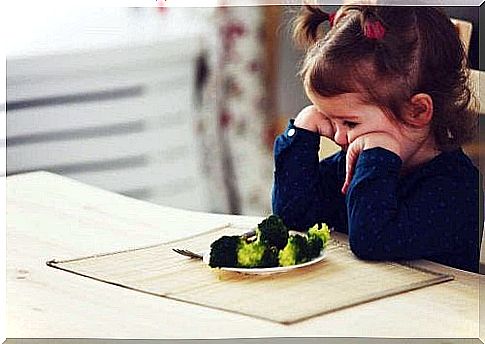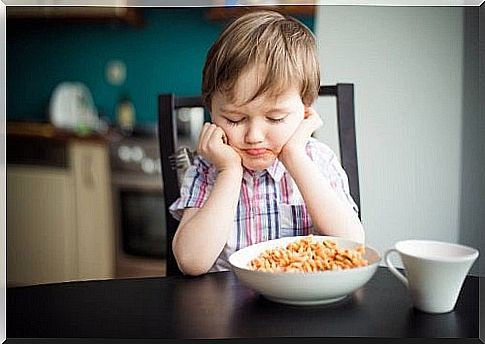Why Can’t We Make Children Eat?

Forcing children to eat can create tension in the kitchen or dining room. Rejection, complaints and bad attitudes arise when eating. The environmental factor is extremely important in childhood because it determines how a child faces a situation after he grows up.
Each person’s nutritional needs are different. Michael Phelps’ calorie consumption doesn’t have to be anything like Mark Zuckerberg’s. Both have different lifestyles, specific routines, and burn a certain amount of calories. The same happens with children, each one has a different routine.
Consequences of forcing children to eat
Of course, it is important that you know the physical and psychological consequences involved in forcing children to eat. It’s a complicated situation for both you and them. Try to maintain constant communication with your child so that you know what he or she really thinks. If she still has no apparent appetite, try other options, such as some natural remedies.
1. Have eating disorders
All habits start in childhood. The way a little one eats food in its first years of life will determine how its physical health will develop. Forcing the child to eat, according to experts, can cause obesity in the future. It is imperative that your child knows that he should not eat just to obey, ideally, he should eat with pleasure and until he feels satisfied.

Another aspect that can affect your child’s metabolism is sedentary lifestyle. Keep this condition out of your child’s routine as it can transcend into more serious problems like obesity or heart problems. Try to get your little one started in some sport and see how their willingness to eat will improve.
2. Become dependent on parents
From childhood, we must cultivate in children the ability to value themselves. Also, you should be aware of what decisions are right for your body. How to do this? Helping the child to discover what his limits are and how far he is able to eat.
A good self-esteem will also help. Self-esteem is often linked to maturity. Your child needs to be as mature as his age requires so that he understands for himself that he shouldn’t force himself to eat all the food if he doesn’t want to. It is important that as parents, we teach children to be judgmental both inside and outside the home.
3. They are not able to look after their well-being
If you force a child to eat when he doesn’t want to, you will create unhealthy behavior in him. You won’t have any ability to say “this is good for me” or “this food doesn’t suit me” . Therefore, she will have a misconception about her well-being as a person. Talk to her, teach her the importance of taking care of her body.
4. It costs them to make decisions
Certainly, each person must have a level of autonomy, both physically and mentally. This ability can develop from an early age and grow stronger over the years. Like? Well, as simple as giving your child decision-making power. Instead of forcing children to eat, ask them how much food they want.

Practice how food will help you to strengthen your decisions and, in addition, generate autonomy to choose what you want, how and when you want it. It is therapy for both, as the father and the son, to learn to respect each other.
5. Hold resentment
When your child doesn’t want to eat, it usually triggers a stressful situation at the table. Not consuming enough calories, starving or lacking vitamins are just some of the concerns parents have. Worrying is completely normal.
However, falling into that level of stress at the table is not healthy for either member. It can have serious family consequences such as resentment. We recommend that you be patient, try to make mealtime a pleasant time for everyone.
How can you motivate your kids to eat?
Taking into account the psychological and physical risks involved in forcing children to eat, we present several options to motivate them to eat better.
With fun recipes
Children by nature are creative beings and people in general are very visual. The saying goes that we eat with our eyes. Therefore, it is important that your child’s food dish is more than beautiful, it is fun. We understand that spinach is a staple in your little one’s diet, so how about including it in your pancake mix? Innovation is the key, use the recipes.
Desserts after meals
Certainly, motivation to succeed is an excellent technique for inculcating discipline and serenity in your goals in your child. This generates the effects that will mark the life of your little one, because he will understand that to get the things he wants, he must make an effort. Eating time is not part of that. Explain that if you eat until you feel full, you will get your favorite dessert. It should not be done as blackmail, but as a goal to be achieved.

Include your favorite foods on the plate
Without a doubt, the success of any relationship is communication. Have you ever asked your child what their favorite food is? If you know, you have the magic key. Pick up your favorite dish and each day add a variation. Monday, add some carrots; Tuesday, serve it with fish; and so on. Your child will see their favorite dish in different ways, which will look like fun.
Conclusions
For example, try inviting him to watch a game of your favorite football team if he eats enough vegetables. If following these recommendations, your child still has no appetite and is losing weight, see a doctor. This way you won’t have to force children to eat.









